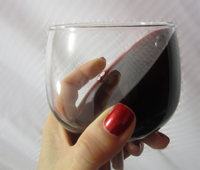For many women who enjoy a glass of wine, research showing that relatively small amounts of alcohol can raise their risk of breast cancer are disconcerting, to say the least. And confusing, too.
How much drinking is OK? Isn’t a glass of red wine a day good for your heart — and couldn’t that be more important?
In the past five or 10 years, knowledge about alcohol and breast cancer has been changing as studies produce new results and are publicized, sometimes over-dramatically, in the media. At the same time, there’s growing evidence that moderate drinking can be healthy for the heart.

Research on alcohol and breast cancer is relatively recent, and many early studies came from Europe, where women tend to drink more than in the United States, says Dr. Wendy Chen, a breast cancer specialist at Dana-Farber.
Last November, Chen and colleagues at Brigham and Women’s Hospital reported in the Journal of the American Medical Association that women who drank as little as three to six glasses of wine or other alcoholic beverages a week increased their breast cancer risk by about 15 percent.
The findings caught many women by surprise. Last they had heard, doctors were saying women (and men) could safely have one drink a day. Now they were being warned that even this level elevated their breast cancer risk.
Although some researchers contend there is no “safe level” of alcohol for breast cancer risk, others argued that one daily drink wasn’t harmful. (One drink is defined as 12 ounces of beer, a 5-ounce glass of wine, or 1.5 ounces of hard liquor.)
But Chen and her colleagues decided to look at even less-frequent drinking, taking advantage of nearly 30 years of data on lifestyle factors and health in the large Nurses’ Health Study.
Overall, women who averaged three to six drinks a week were 1.15 times — or 15 percent — more likely to develop breast cancer. Put another way, for every 100,000 people, this moderate consumption of alcohol was responsible for 330 cases of breast cancer.
Chen explains that slight variations (a drink every day on vacation, then cutting back for a few days) aren’t important; it’s the cumulative lifetime consumption that influences the cancer risk. “It averages out over time,” she says.
Is this risk offset by the cardiovascular health benefits of moderate drinking? That’s up to each woman to decide, says Chen, adding that an individual’s family history of heart disease or cancer can be taken into account.
Will this knowledge affect how much you drink? Please tell us in the comments.

Wow, Thats Hard I love my Red wine! Is it the Sugar content in the wine? Dr.Chen is my doctor! Love her! Im a 10 year Breast Cancer Survivor. Hopefully My Healthy eating of Tons of Green veggies and Intake of Chia seeds, well Balance it out! You gotta live right!? I feel like everything can cause Cancer these days! Frustrating!
Although heart disease and cancer are both in my family history, cancer seems to be a bigger risk for me, so I would curtail alcohol consumption. I would be interested though in the demographics and/or cancer family history to see if those who consume more alcohol might already have a genetic predisposition to the disease.
I am a 68 year old woman who has recently completed treatment for breast cancer: mastectomy, chemotherapy and radiation. I used to drink about four glasses of wine per week despite a family history of breast cancer as I was under the impression that a moderate amount of drinking alcohol was okay. Once I was diagnosed seven months ago I ceased drinking alcohol altogether as I feel anything I can do to take charge of my health I am willing to do.
Is it the sugar? I’ve been drinking organic tart cherry juice because it has more of the heart healthy nutrients than wine does, without the alcohol. In view of the study perhaps I shouldn’t be doing this because of the sugar? Also it seems like 330 out of 100,000 people is not too far outside the realm of the average number of people who get breast cancer anyway? It would be useful to know if it is the alcohol or sugar content that’s the problem.
Hi Carrie —
Thank you for your question and for reading our Insight blog. We spoke with Dr. Chen about this and she confirmed that the risk is related to alcohol content, not the sugar content.
Wishing you all the best!
I read that a combination of alcohol and estrogen (Premarin) increased breast cancer chances.
I think a lot of the comments are correct– I wonder if all other factors were exactly the same– hormone levels, body fat ratios, SAME level of health/fitness, and genetics. If my dad were an alcoholic and that affected my fetal DNA, or it combined with my teetotaling mother’s family predisposition for female cancers– was that accounted for? Also, I’d love to know how to take the sugar out of alcohol and keep it palatable and effective because I sure want some of that. Finally, researchers PLEASE remember that when the general public who has not had breast cancer sees this type of headline they will tend to blame the cancer sufferer– they will judge that his/her drinking behavior caused the cancer. Even if it’s the person who has just one drink a week. Many survivors know this type of judgment– it’s not pleasant to be grilled on whether you ate healthy enough to keep cancer at bay. This causes more shame and trauma for people who already have enough of that. Do no harm. Please.